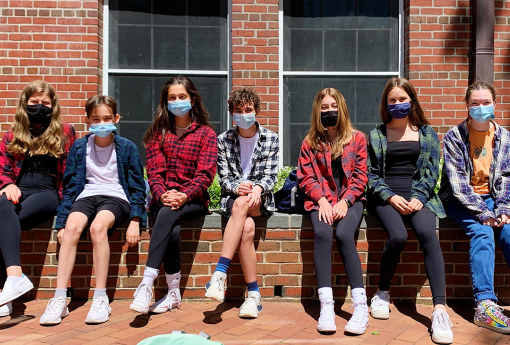
The Need of Being Versed In Farm Things
May 25, 2019
As I follow the stretch of pavement that leads to Fire Pond, tall, powerful trees loom over the path, guarding this hidden paradise like armor. The laughter from my classmates emerges from the forest; they are at the peak of pure happiness. They may be walking out onto the meager ice to see if it will hold their weight, splashing water on each other with long-broken homemade boat paddles, or racing around the woods that encircle the pond. No organized recreation here – just woods, mud, water and sixth graders. I’m coming closer now, I can smell the fresh scent of forest. Stepping in, I take a deep breath and store this place in the back of my mind so I can take it wherever I go.
My friends exploring Junebug Mountain call me over from Fire Pond to help build our fort. An outsider would see two rocks with sticks piled over them, but to us, this is more. This our home away from home. When my classmates and I look up at Junebug we see a full-fledged jungle gym, to use at recess or even in math class. I think there is no better way to learn about slope (y=mx+b) then to take what we see in the classroom and apply it to a place we have climbed up and down at least 100 times. Rise over run takes on new meaning when you’re scrambling up Junebug taking measurements with eight-foot-long poles. Have you ever come in from math class with grass-stained knees?
You can spot Columbine Hill from Junebug standing quiet and proud above all. The flowers there grow in abounding shades, like new crayons shimmering in their box, just waiting to be picked up. You can run up and down the hill, or rest on one of the benches to silently watch and listen, along with the seasoned yellow house. There is something else that makes this hill different; that something is history. If you touch the foundation of the house, you will be transported back to the eighteenth century. Place your fingertips up a little higher, and you might be touching a place where Mary C. Wheeler put her paint-stained hands. Elsewhere on the hill, bricks are scattered around the base of a charred, stone chimney, and you can tell the flames once danced there on cold winter nights. How does this tenacious chimney from the past relate to my time at the Farm? In our first week of the Farm Program, my class hiked up Columbine Hill and sat in a circle near the chimney. We read and discussed the poem, “The Need of Being Versed in Country Things,” by Robert Frost, which is about a house that has burned down, and all that is left is its chimney. We talked about the many layers of the poem and its theme of rebirth. This was a breakthrough moment for me, as well as my whole class. To be able to put yourself into a Robert Frost poem is a rare privilege.
“All in, All in, All in!” my classmates echo each other as the recess horn blows. We come running into the organic aroma of baby quail poop. Or on Fridays, the delicious smell of the lunch we prepared before recess. Steam from the crock-pots wafts across our noses during class, making the whole room a mouth-watering haven. This place with its airfoil-shaped roof, boisterous animal sounds streaming out the propped-open front door, and cozy fire crackling: this can only be The Eliza Mauran Blackwell Pavilion. Classroom, kitchen, art studio, mad-scientist lab, by day; animal kingdom by night. The Pavilion is home to Ed, a bunny; Mocha, a disabled adult quail; Bella, a guinea pig; and Jenny, a black cat as old as the Farm Program. Mr. Pieri, the creative, wacky, lovable Farm teacher, gallops in breathless and holding his blowtorch announces that today we are going to set the floor on fire. I doubt that I will ever take another class where I build a boat that holds three people, shoot straw arrows, use an air compressor to set off water rockets, slingshot arrows across the lawn, explode mentos-filled soda, drop a protected egg off the porch and collapse a metal bucket onto itself by only using air pressure.
The Farm has two faces. One it shares with the world as athletics fields, but its hidden side of Fire Pond, Junebug Mountain, Columbine Hill, and the Pavilion it only reveals to those lucky enough to be sixth graders.
Naomi Shimberg ’18
(written while a student)

